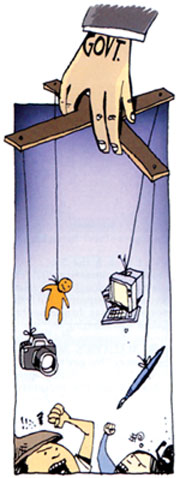The Nepali media has earned well-deserved praise for protecting and upholding democracy and its own freedom during direct royal reign since 2002.
Notwithstanding attempts to sully its message and collusion of some colleagues with authoritarian forces, the media withstood pressure from extremists of the left and right. Nepali newspapers, magazines, radio stations, television and even blogs defied controls, courageously defending freedom of expression not just for themselves, but to defend the rights of citizens to information.
In doing so, they built on gains since 1990 to enhance professionalism in print, production values on tv and the spread of community radio. Indeed, Nepal's progressive legislation to deregulate the FM band is far ahead of our neighbours and is the envy of broadcasters in the region.
Which is why we have to use the triumph of people power to never again allow the misuse of government media for shameless propaganda. It is not just the royal regime that is guilty of this: successive democratic governments in the 1990s treated NTV, Radio Nepal and Gorkhapatra as party mouthpieces.  State ownership of media doesn't mean state control. It is anachronistic in a democracy for elected governments to own and operate a propaganda arm. The governing boards of the three official organs must now be made autonomous and brought under purview of parliament, not the government of the day. The freedom and independence enjoyed by state media during the current interregnum must be institutionalised, otherwise they will once more lose them to politicians who know no better.
State ownership of media doesn't mean state control. It is anachronistic in a democracy for elected governments to own and operate a propaganda arm. The governing boards of the three official organs must now be made autonomous and brought under purview of parliament, not the government of the day. The freedom and independence enjoyed by state media during the current interregnum must be institutionalised, otherwise they will once more lose them to politicians who know no better.
Nowhere is this independence and credibility more critical than in Radio Nepal, the medium with the widest reach. The pro-democracy warriors who were propelled to power by the April Uprising must realise that democracy in future will be best defended by participation of all citizens, and there is no participation without communication. A free radio will empower people with information, and foster communication as a tool for social change and development.
Unshackling state media must go hand-in-hand with building on the success of community radio stations by streamlining the application and registration process and reducing the fees of non-profit grassroots FM stations to make them sustainable.
As for the rest of us, it is time for introspection. Somewhere along the way have we crossed the line between activism and journalistic professionalism? Are we now repeating the mistakes of the 1990s when we confused freedom with free-for-all journalism that unnecessarily spread cynicism about politicians and tarnished democracy itself?
We need to look at the larger picture: politics is not just a quarrel that makes headlines. It is about ensuring accountability and efficiency so governments remain focussed on the urgent task of raising living standards of all citizens.


